| Srl | Item |
| 1 |
ID:
180306
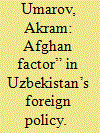

|
|
|
|
|
| Summary/Abstract |
This article examines the historical development of Uzbekistan's stance on the situation in Afghanistan, outlines its main stages, achievements and challenges, investigates the major initiatives of Tashkent on solving conflict in the neighbouring country before and after 2016, the major priorities of its contemporary foreign policy towards the Afghan conflict, and the Uzbek government's expectations from the upcoming developments in Afghanistan.
|
|
|
|
|
|
|
|
|
|
|
|
|
|
|
|
| 2 |
ID:
018116
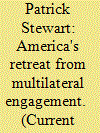

|
|
|
|
|
| Publication |
Dec 2000.
|
| Description |
430-439
|
|
|
|
|
|
|
|
|
|
|
|
|
|
|
|
| 3 |
ID:
170685
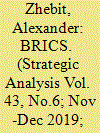

|
|
|
|
|
| Summary/Abstract |
Having overcome its ‘middle-power’ complex during the centre-left governments, Brazil obtained a relatively robust position in international politics as global power, siding with G-20, BRICS and other multilateral bodies. However, since the 2018 presidential elections Brazil has been undergoing a visible shift in its foreign policy towards more alignment with the US and the West that questions its traditional international autonomy, multilateralism, South-South engagement and environmental activism. This shift may consequently affect not only its positioning within the BRICS and governance alike, but also cause a slide into a conservative complacency with a hegemonic vision of the multipolar world.
|
|
|
|
|
|
|
|
|
|
|
|
|
|
|
|
| 4 |
ID:
057304
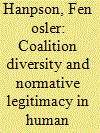

|
|
|
| 5 |
ID:
137612
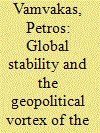

|
|
|
|
|
| Summary/Abstract |
The geopolitical game of the twenty-first century will be multilateral and multidimensional, placing great emphasis on political and commercial interests such as resources, markets, ecology, and finance than on military interests. This essay argues that the eastern Mediterranean as an area of geostrategic importance will continue to be vital to global geopolitics and that consigning it to the back burner is shortsighted. The three continents that meet at this crossroads account for almost 90 percent of the global population as well as over 60 percent of global gross domestic product.
|
|
|
|
|
|
|
|
|
|
|
|
|
|
|
|
| 6 |
ID:
108600
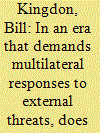

|
|
|
| 7 |
ID:
089513


|
|
|
|
|
| Publication |
2009.
|
| Summary/Abstract |
In recent years, Indian leaders have elevated the prominence of democratic rhetoric in their regional and international political discourse. This paper examines India's record of democracy promotion. It argues that India has much to gain by selectively supporting democracy in neighboring countries. Furthermore, participating in multinational efforts at democracy promotion offers India a potential vehicle for global leadership.
|
|
|
|
|
|
|
|
|
|
|
|
|
|
|
|
| 8 |
ID:
057730
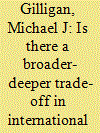

|
|
|
| 9 |
ID:
087904
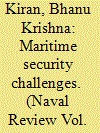

|
|
|
| 10 |
ID:
158142
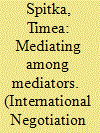

|
|
|
|
|
| Summary/Abstract |
The conditions under which multilateral international intervention are effective in ending a violent conflict is a critical question for scholars and practitioners. Scholarly studies have demonstrated the importance of a united intervention but have been in disagreement over the effectiveness of neutral versus partisan intervention. This article examines the conditions under which mediators construct a consensus on the type of intervention process. What are the factors that enable a consensus on a neutral versus a partisan intervention? Distinguishing between four types of international intervention processes – united-neutral, united-partisan, divided-partisan, and divided neutral and partisan intervention – this article argues that it is a united intervention, whether united partisan or united-neutral, that contributes to creating leverage on conflicting parties to end a conflict. The article examines consensus building among mediators within two divergent case studies: Northern Ireland and Bosnia and Herzegovina.
|
|
|
|
|
|
|
|
|
|
|
|
|
|
|
|
| 11 |
ID:
098476
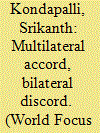

|
|
|
| 12 |
ID:
085111
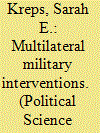

|
|
|
|
|
| Publication |
2008.
|
| Summary/Abstract |
Sarah E. Kreps advances a two-level definition of multilateralism that incorporates both quantitative and qualitative attributes of cooperation. She argues that the relative decline in American power, rather than leading to more robust multilateralism, might instead make UN-authorized interventions less tenable and ad hoc "coalitions of the willing" a viable alternative.
|
|
|
|
|
|
|
|
|
|
|
|
|
|
|
|
| 13 |
ID:
098099
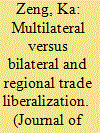

|
|
|
|
|
| Publication |
2010.
|
| Summary/Abstract |
In recent years, at the same time it has pursued multilateral trade negotiations via membership in the World Trade Organization (WTO), China has embraced a regional approach to trade liberalization by negotiating a number of bilateral or regional free trade agreements (FTAs) with its trading partners. This paper examines China's increasingly active FTA diplomacy and seeks to explain China's motives for pursuing expanded FTAs. Specifically, this paper argues that while China's FTA activism reflects considerations about enhancing China's influence in the Asia-Pacific region, capturing the economic gains of FTA participation, and minimizing the trade and investment diversion resulting from the competitive dynamics of regional trade liberalization, the move toward expanded FTAs is also consistent with the desire to create alternative bargaining forums over trade issues that could help to stabilize expectations as well as the need to use FTAs to control the pace of trade liberalization so as to accommodate protectionist pressure emanating from domestic interest groups. In particular, this paper highlights the impact of domestic politics on China's FTA negotiations through a detailed discussion of how pressure from protectionist seeking interests influences the scope and depth of China's FTAs.
|
|
|
|
|
|
|
|
|
|
|
|
|
|
|
|